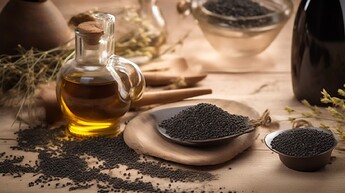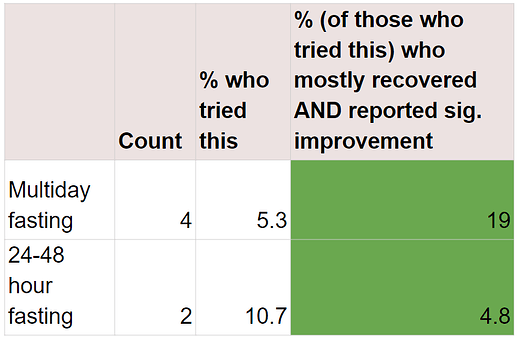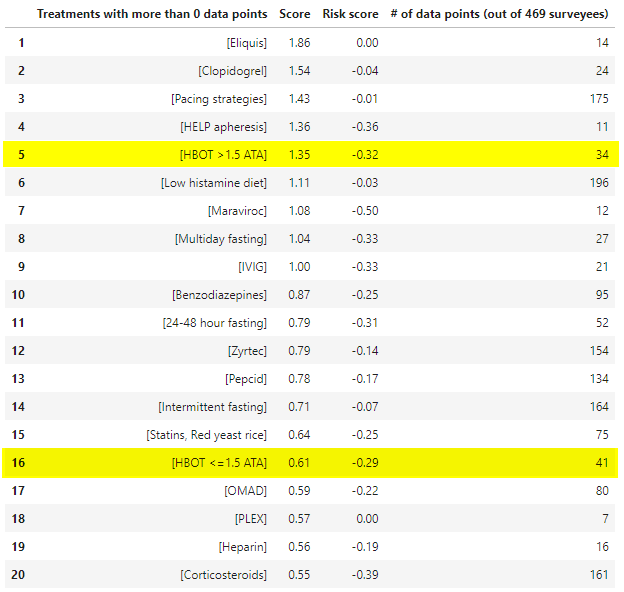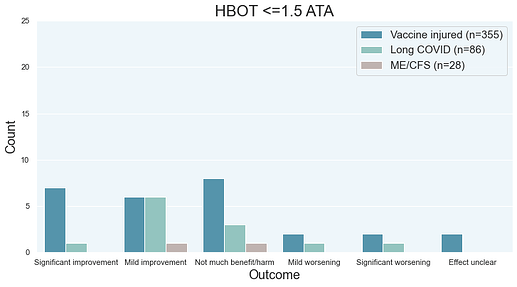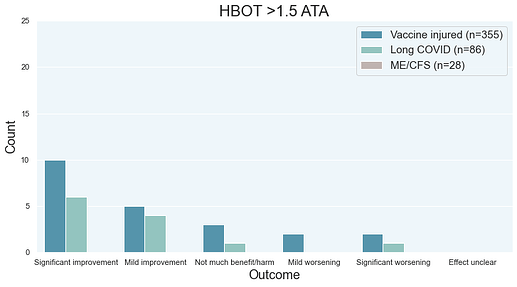Based on survey data (video | slides), we’re seeing that people seem to need higher doses to recover.
Unfortunately, a lot of the current protocols recommend lower dosages rather than safe high dosages. They simply aren’t paying attention to patient experiences and the available data on this topic.
Case study #1: Intermittent fasting is weak, longer fasts are needed
The table below shows that roughly twice the people succeeded on longer >2 day fasts compared to 1-2 day fasts (24-48 hour fasting). Adjusting for the popularity of these diets, we see that longer fasts have a success rate that’s roughly four times higher (though it’s possible that people tried shorter fasts first, and gave up early because they know that longer fasts won’t work for them).
Case study #2: Lower pressure HBOT has roughly the same risk with less reward.
You can find the data by searching “HBOT” here: Treatment Outcomes Survey analysis
The risk score calculation is about the same for both of these treatments. (The score is calculated by assigning a point of -1 for slight worsening and -3 for significant worsening, 0 for everything else.)
Note that you may get oxygen toxicity if you go past the 10-40 session range… so do be careful about how often you do HBOT. Spacing out the sessions should avoid oxygen toxicity.
Case study #3: black seed oil versus capsules and seed
The seed of the Nigella Sativa plant contain very little oil. That may explain why the seeds don’t do much. The capsules are likely being dosed at lower levels than the people buying oil in a bottle. If you simply follow the instructions on the bottle, then typical dosages would be:
- Oil in a bottle: Between 1-4 teaspoons per day. 4.9 to 19.7 mL.
- Capsules: 2.5g per day, equivalent to half a teaspoon. Other brands may recommend 1g / day on the labelling.
Only the people reporting data for nigella sativa oil seem to be mostly recovered. Nobody who took the capsules or seed reported being mostly recovered.
Risk
With the exception of HBOT, risk goes up with dosage. The longer fasting methods have a greater chance of the patient reporting a bad outcome. The same is true for black seed oil.
I would simply try to reduce risk by:
- Starting with low dosages and working your way up.
- Stopping treatment early if symptoms are going the wrong way.
While these risk reducing measures aren’t popular right now, it would be prudent and conservative to implement them. It would be reasonable to expect the opposite is less safe.
Closing thoughts
Unfortunately, the level of medical care is very low right now. But, those suffering deserve high-quality medical care so that’s why I’m collecting data and pushing that information out there.
Prudent experimentation with black seed oil, HBOT, and extended fasting is less risky than most of the crazy things that doctors and patients are trying (e.g. psych drugs for pain).
